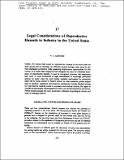Ashford, Nicholas A.
Nicholas Ashford is Professor of Technology & Policy and Director of the Technology & Law Program at the Massachusetts Institute of Technology, where he teaches courses in Environmental Law, Policy, and Economics; Law, Technology, and Public Policy; and Technology, Globalization and Sustainable Development. Dr. Ashford is a Faculty Associate of the Center for Socio-technical Research in the School of Engineering; the Institute for Work and Employment Research in the Sloan School of Management; and the Environmental Policy Group in the Urban Studies Department. He holds both a Ph.D. in Chemistry and a Law Degree from the University of Chicago, where he also received graduate education in Economics. Dr. Ashford is also a visiting scientist at the Harvard School of Public Health and has taught intensive courses in Sustainable Development, and European & International Environmental Law at Harvard University, Cambridge University, UK and at the Cyprus University of Technology.
Dr. Ashford is the co-author of two textbooks/readers used in his classes: Technology, Globalization, and Sustainable Development: Transforming the Industrial State (2018, revised edition, Routledge/Earthscan Press); and Environmental Law, Policy and Economics: Reclaiming the Environmental Agenda (2008, MIT Press). He also authored a major policy work for the Ford Foundation, Crisis in the Workplace: Occupational Disease and Injury, (1976, MIT Press). He co-authored four additional books: Public Participation in Contaminated Communities, (2001); Chemical Exposures: Low Levels and High Stakes (second edition 1998, John Wiley Press); Chemical Exposures: Low Levels and High Stakes, N.A. Ashford and C.S. Miller, Second Edition, John Wiley Press, 1998, 440 pages. Available for free here (click to obtain pdf version); Technology, Law and the Working Environment (second edition 1996, Island Press) and Monitoring the Worker for Exposure and Disease (1990, John Hopkins University Press). He has published several hundred articles in peer-reviewed journals and law reviews.
Dr. Ashford was a public member and chairman of the National Advisory Committee on Occupational Safety & Health, served on the EPA Science Advisory Board, and was chair of the Committee on Technology Innovation & Economics of the EPA National Advisory Council for Environmental Policy and Technology. Dr. Ashford is a Fellow of the American Association for the Advancement of Science and former chair of its Section on Societal Impacts of Science and Engineering. He served as an advisor to the United Nations Environment Programme and is also a member of the editorial board of the Journal of Cleaner Production, the Journal of Environmental Technology and Management, the Journal of Environmental Policy & Governance, and Environmental Innovation & Societal Transitions, He served as co-chair of the US-Greece Council for the Initiative on Technology Cooperation with the Balkans.
Dr. Ashford's research interests include sustainability, trade and environment; regulatory law and economics; the design of government policies for encouraging both technological innovation, and improvements in health, safety and environmental quality; pollution prevention and cleaner/inherently safer production; public participation in contaminated communities; labor's participation in technological change; environmental justice; and reigning in fake news. He has developed methodologies for decision-making in the regulation of chemicals and has extensively investigated the effects of regulation on technological innovation in the chemical, pharmaceutical, and automobile industries. Dr. Ashford's research activities include work for the United Nations Environment Programme, the OECD, and the European Union, as well as for U.S. regulatory agencies and the U.S. Office of Technology Assessment.
http://ashford.mit.edu
Collections in this community
Recent Submissions
-
Abordar la desigualdad: el primer paso más allá del COVID-19 y hacia la sostenibilidad
(2020-07)La pandemia del COVID-19 ha afectado a miles de millones de vidas en todo el mundo y ha revelado y agravado las desigualdades sociales y económicas que han surgido durante las últimas décadas. A medida que los gobiernos ... -
Legal Considerations of Reproductive Hazards in Industry in the United States
(1984)Clearly, the human risks posed by reproductive hazards in the work place are both serious and far-reaching. An effective control strategy, then, must be one that emphasises prevention while preserving employment opportunities ... -
Legal Considerations of Reproductive Hazards in Industry in the United States
(1984)Clearly, the human risks posed by reproductive hazards in the work place are both serious and far-reaching. An effective control strategy, then, must be one that emphasises prevention while preserving employment opportunities ...

